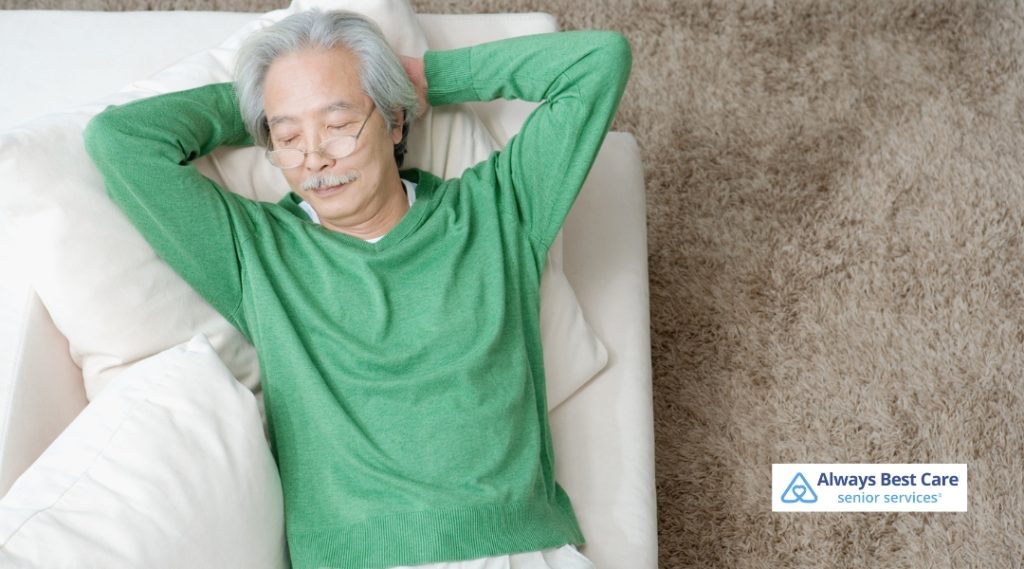Getting Better Sleep: A Senior’s Guide to Beating Insomnia in Glenview, IL

In the peaceful neighborhoods of Glenview, seniors deserve nights as restful as their days are fulfilling. Yet for many older adults, insomnia has become an unwelcome part of daily life, turning bedtime into a struggle rather than a comfort.
Whether it’s difficulty falling asleep, waking up too often, or feeling tired despite getting a full night’s sleep, sleep troubles can take a toll on your health, mood, and quality of life. The good news? With the right approach, better sleep is within reach.
Table of Contents
Why Sleep Becomes More Challenging With Age
As we grow older, sleep often becomes lighter, shorter, and less predictable. One key factor is the body’s decreased production of melatonin, the hormone that helps regulate the sleep-wake cycle.
With less melatonin, falling asleep and staying asleep become more difficult. Aging also affects sleep architecture, meaning seniors tend to spend more time in lighter stages of sleep and less time in the deeper, restorative stages.
Health conditions commonly associated with aging, such as arthritis, heart disease, or frequent nighttime urination, can cause discomfort and interruptions throughout the night.
Emotional and mental health also play a role. Feelings of isolation, anxiety, or grief often surface more strongly at night, making it harder to relax and drift off.

Setting a Steady Sleep Schedule
A consistent sleep schedule is one of the most effective ways for seniors to improve the quality of their rest. Going to bed and waking up at the same time every day—even on weekends—helps reinforce the body’s natural circadian rhythm. Over time, this regularity trains your internal clock, making it easier to fall asleep, stay asleep, and wake up feeling refreshed.
Establishing a relaxing evening routine can also help signal to your body that it’s time to wind down. Whether it’s a warm bath, a few minutes of reading, or quiet time with soft music, these simple habits build the foundation for a restful night.
Creating a Comfortable Sleep Environment at Home
The bedroom should be a calm, quiet sanctuary that promotes sleep. For seniors, comfort and safety are both essential. A supportive mattress and pillows can help ease joint or back pain, while breathable bedding keeps the body at a comfortable temperature. Blackout curtains, white noise machines, or a fan can reduce disruptions from light or sound.
Nightlights and clear walkways also make it easier and safer to move around if needed. Reducing screen time before bed is another crucial step—TVs, tablets, and phones emit blue light that can disrupt melatonin production, making it harder to fall asleep.

Making Smart Dietary Choices in the Evening
What you eat and drink in the hours leading up to bed can have a significant impact on how well you sleep. Heavy, spicy, or sugary foods may lead to indigestion or restlessness, while caffeine—even in the late afternoon—can linger in your system, making it hard to wind down.
Alcohol might seem to help you fall asleep initially, but it often disrupts the deeper stages of sleep later in the night. To support better rest, try to eat a healthy dinner at least two to three hours before going to bed. If a snack is needed, choose something light and sleep-friendly, like yogurt, a banana, or a small bowl of oatmeal. Staying mindful of evening choices can help set the stage for a more peaceful night.
Move More During the Day for Deeper Sleep at Night
Staying physically active during the day plays a key role in how well you sleep at night. For seniors, regular movement helps burn off excess energy, reduces tension, and supports the body’s natural sleep-wake cycle. Whether it’s a walk around the neighborhood, stretching, swimming, or gentle chair exercises, even light activity can promote deeper, more restful sleep.
Physical activity also helps ease pain, improve mood, and support overall health—all of which contribute to better rest. Just be sure to finish exercising at least a few hours before bedtime, as being too active late in the evening can make it harder to settle down.

Finding Calm: Managing Stress Before Bedtime
Even when the body feels tired, an anxious or overactive mind can keep sleep out of reach. For many seniors, worries about health, finances, or loved ones surface more strongly at night, leading to restlessness and difficulty falling asleep. Creating a calming bedtime routine can help quiet the mind and ease emotional tension. Practices like deep breathing, meditation, journaling, or listening to gentle music can encourage relaxation and signal to your body that it’s time to wind down. Limiting news consumption and screen time before bed can also reduce mental stimulation. Finding a sense of calm each evening is an essential part of preparing for a good night’s rest.
Reviewing Medications That Might Impact Sleep
Medications can have a surprising impact on sleep quality. Some prescriptions—especially those for blood pressure, heart conditions, asthma, or depression—can cause side effects like insomnia, vivid dreams, or frequent awakenings. Diuretics, in particular, may lead to nighttime trips to the bathroom that disrupt rest.
Even over-the-counter products like cold medicines or sleep aids can interfere with natural sleep cycles. If you’ve been experiencing ongoing sleep issues, it’s important to talk with your doctor or pharmacist about the medications you’re taking. They may be able to adjust dosages, change the timing, or suggest alternatives.

How In-Home Care Can Make a Difference
Caregivers help establish calming bedtime routines tailored to each individual’s needs. From preparing a warm drink and setting up a cozy sleep environment to assisting with hygiene or offering a calming presence at night, these small but meaningful steps can ease the transition into sleep. Caregivers also help reduce fall risks by ensuring pathways are clear and well-lit, which is especially important during nighttime trips to the bathroom.
During the day, in-home care promotes habits that support better rest at night—encouraging regular activity, nutritious meals, and medication routines that are aligned with sleep goals. And perhaps most importantly, caregivers offer companionship and emotional reassurance, which helps ease the feelings of loneliness or stress that often keep seniors awake.
Better Sleep Starts With Trusted Care in Glenview!
At Always Best Care of Gelnview, we understand the challenges that come with aging, including sleep difficulties. Our compassionate caregivers can help establish a calming nighttime routine, assist with daily activities, and provide companionship to reduce stress and promote relaxation.
Contact Always Best Care of Glenview at (847) 796-8835 to schedule a care consultation and learn how our in-home care services can improve your quality of life. A restful night’s sleep is just a call away.





